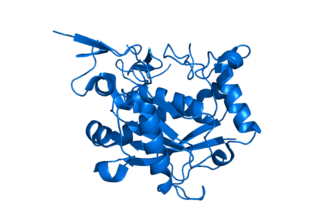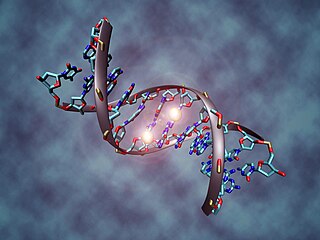Related Research Articles

Chemotherapy is a type of cancer treatment that uses one or more anti-cancer drugs as part of a standardized chemotherapy regimen. Chemotherapy may be given with a curative intent or it may aim to prolong life or to reduce symptoms. Chemotherapy is one of the major categories of the medical discipline specifically devoted to pharmacotherapy for cancer, which is called medical oncology.

The National Center for Biotechnology Information (NCBI) is part of the United States National Library of Medicine (NLM), a branch of the National Institutes of Health (NIH). It is approved and funded by the government of the United States. The NCBI is located in Bethesda, Maryland, and was founded in 1988 through legislation sponsored by US Congressman Claude Pepper.

Clifford Smith, Jr., better known by his stage name Method Man, is an American rapper, record producer and actor. He is a member of the East Coast hip hop collective Wu-Tang Clan, and is half of the hip hop duo Method Man & Redman. He took his stage name from the 1979 film Method Man. In 1996, Smith won a Grammy Award for Best Rap Performance by a Duo or Group for "I'll Be There for You/You're All I Need to Get By", featuring R&B singer Mary J. Blige, with whom he currently stars in Power Book II: Ghost, a spin-off of Power.
MEDLINE is a bibliographic database of life sciences and biomedical information. It includes bibliographic information for articles from academic journals covering medicine, nursing, pharmacy, dentistry, veterinary medicine, and health care. MEDLINE also covers much of the literature in biology and biochemistry, as well as fields such as molecular evolution.
PubMed is a free search engine accessing primarily the MEDLINE database of references and abstracts on life sciences and biomedical topics. The United States National Library of Medicine (NLM) at the National Institutes of Health maintain the database as part of the Entrez system of information retrieval.

The Black Cap was a pub in Camden Town, London known for its drag cabaret, and popular from the mid-1960s until it closed in April 2015.

Integrin alpha-V is a protein that in humans is encoded by the ITGAV gene.

Frizzled-9(Fz-9) is a protein that in humans is encoded by the FZD9 gene. Fz-9 has also been designated as CD349.

Frizzled-10(Fz-10) is a protein that in humans is encoded by the FZD10 gene. Fz-10 has also been designated as CD350.

A disintegrin and metalloproteinase with thrombospondin motifs 1 is an enzyme that in humans is encoded by the ADAMTS1 gene.

Dual specificity protein kinase TTK also known as Mps1 is an enzyme that in humans is encoded by the TTK gene.

KIAA1967, also known as Deleted in Breast Cancer 1, is a protein which in humans is encoded by the KIAA1967 gene.

Computational epigenetics uses statistical methods and mathematical modelling in epigenetic research. Due to the recent explosion of epigenome datasets, computational methods play an increasing role in all areas of epigenetic research.

A disintegrin and metalloproteinase with thrombospondin motifs 8 is an enzyme that in humans is encoded by the ADAMTS8 gene.

Rho-related BTB domain-containing protein 2 is a protein that in humans is encoded by the RHOBTB2 gene.
"Cancer Man" is the fourth episode of the first season of the American television drama series Breaking Bad. Written by Vince Gilligan and directed by Jim McKay, it aired on AMC in the United States and Canada on February 17, 2008.

Aclarubicin (INN) or aclacinomycin A is an anthracycline drug that is used in the treatment of cancer. Soil bacteria Streptomyces galilaeus can produce aclarubicin. It can induce histone eviction from chromatin upon intercalation.

Walter Hartwell White Sr., also known by his alias Heisenberg, is a fictional character and the protagonist of the American crime drama television series Breaking Bad, portrayed by Bryan Cranston.

Leukemia & Lymphoma is a peer-reviewed medical journal published by Informa Healthcare. It covers basic and clinical aspects of hematologic malignancies. The editors-in-chief are Aaron Polliack, Koen Van Besien, and John Seymour.
The Cervical Cancer gene DataBase (CCDB) is a database of genes involved in the cervical carcinogenesis. The Cervical Cancer Database is the first database that has been manually curated. The database serves as an entity for clinicians and researchers to examine basic information as well as advanced information about the genes that differentiates into cervical cancer. There are 537 genes that have been cataloged into the CCBD. The genes that have been cataloged based on polymorphism, methylation, amplification of genes, and the change in how the gene is expressed. Science investigators have examined data that compared normal cervical cells with malignant cervical cells which has been used to study the different gene expressions that result in cervical cancer. Of the 500,000 women that have succumbed to cervical, most are from developing countries as well as of the low socioeconomic level in developed countries. The CCBD is designed to present information that will novel therapeutic treatments for leading cause of cancer within the population of women.
References
- ↑ Maté Ongenaert, Leander Van Neste, Tim De Meyer, Gerben Menschaert, Sofie Bekaert, and Wim Van Criekinge. PubMeth: a cancer methylation database combining text mining and expert annotation. doi : 10.1093/nar/gkm788